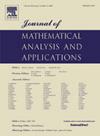Crown relative equilibria for the vortex problem
IF 1.2
3区 数学
Q1 MATHEMATICS
Journal of Mathematical Analysis and Applications
Pub Date : 2025-01-20
DOI:10.1016/j.jmaa.2025.129287
引用次数: 0
Abstract
We consider planar central configurations of the κn-vortices problem consisting of κ groups of regular n-gons of equal vorticities, called -crown, or equivalently, we study the existence of periodic solutions, called relative equilibrium, for which the vortices rigidly rotate around the center of vorticity, with angular velocity . We derive the equations of central configurations for the general -crown. Next, we give a necessary condition for a -crown: either the rings are nested (the vertices of the two n-gons are aligned) or they must be rotated by an angle (twisted case). After that, we are able to give the exact number of central configurations in function of the ratio of vorticities. More precisely, we show that in the nested case there are two central configurations when the ratio of vorticity is positive, while for a negative ratio of vorticity there exists a unique central configuration for an appropriate radius. For the twisted case, it is observed that the study depends on the number of vortices in each n-gon and the admissible ratio of vorticities must be in an appropriate interval. Our arguments are analytic and differ significantly from the Newtonian case.
求助全文
约1分钟内获得全文
求助全文
来源期刊
CiteScore
2.50
自引率
7.70%
发文量
790
审稿时长
6 months
期刊介绍:
The Journal of Mathematical Analysis and Applications presents papers that treat mathematical analysis and its numerous applications. The journal emphasizes articles devoted to the mathematical treatment of questions arising in physics, chemistry, biology, and engineering, particularly those that stress analytical aspects and novel problems and their solutions.
Papers are sought which employ one or more of the following areas of classical analysis:
• Analytic number theory
• Functional analysis and operator theory
• Real and harmonic analysis
• Complex analysis
• Numerical analysis
• Applied mathematics
• Partial differential equations
• Dynamical systems
• Control and Optimization
• Probability
• Mathematical biology
• Combinatorics
• Mathematical physics.

 求助内容:
求助内容: 应助结果提醒方式:
应助结果提醒方式:


